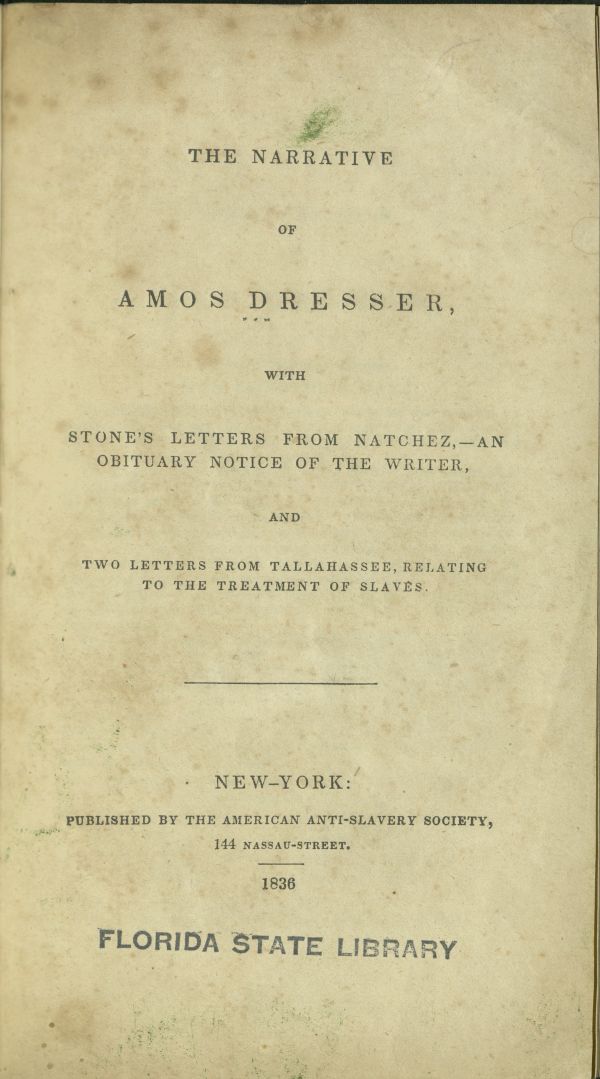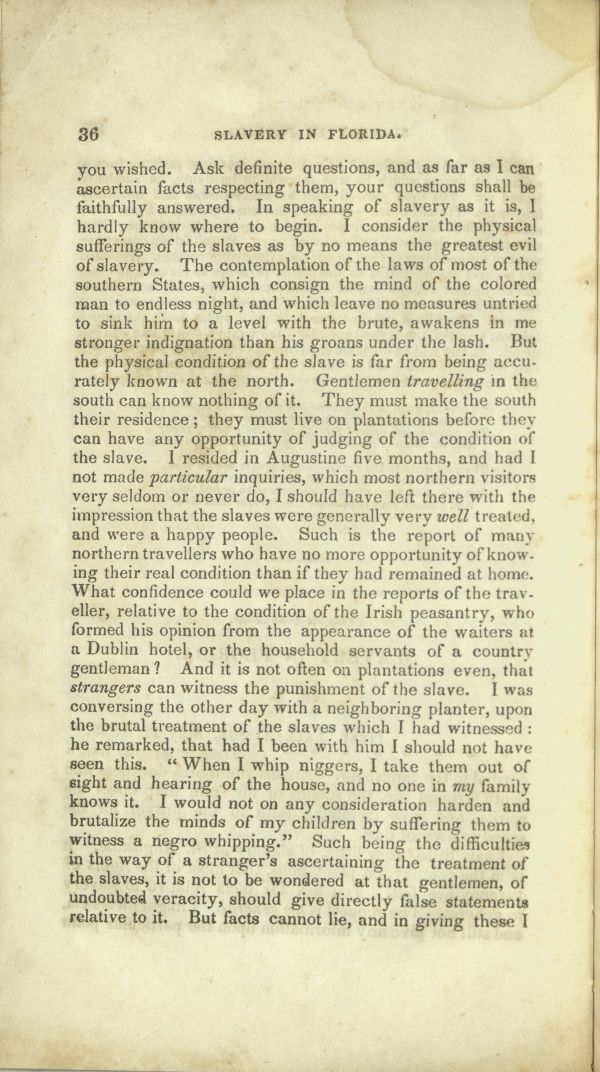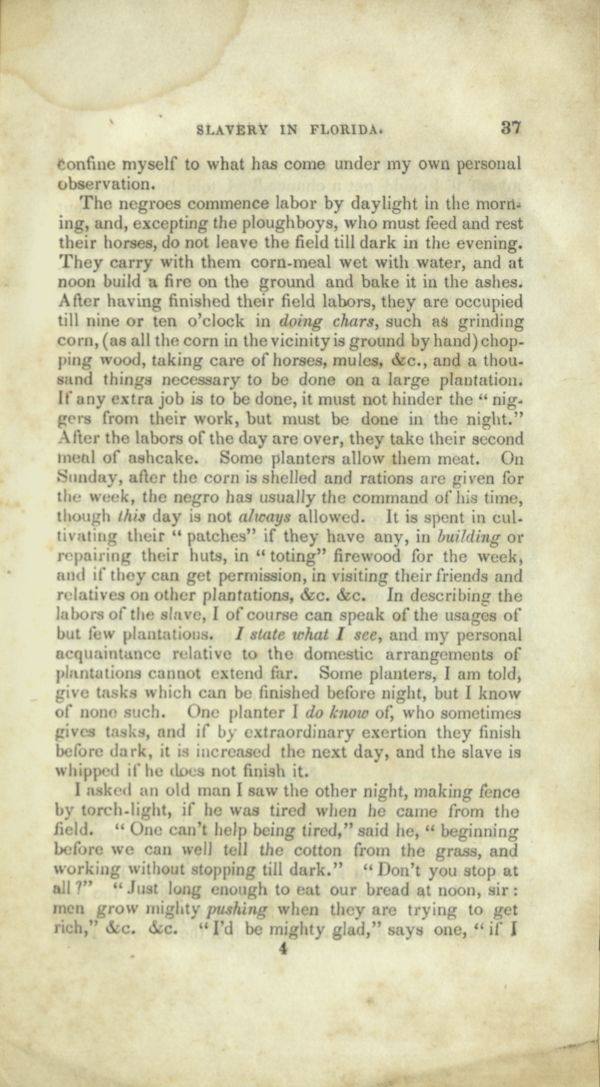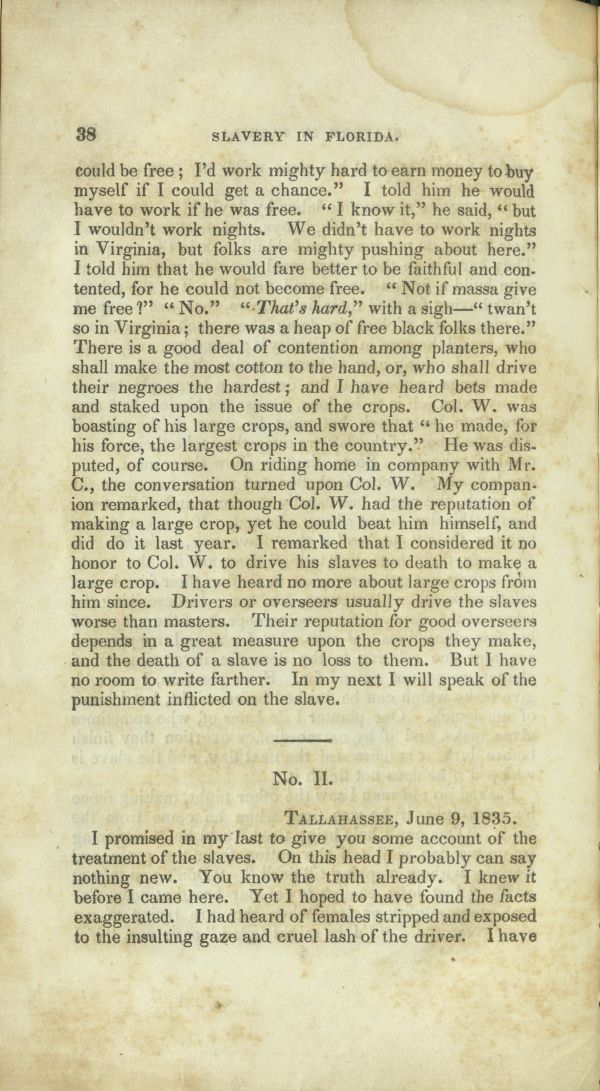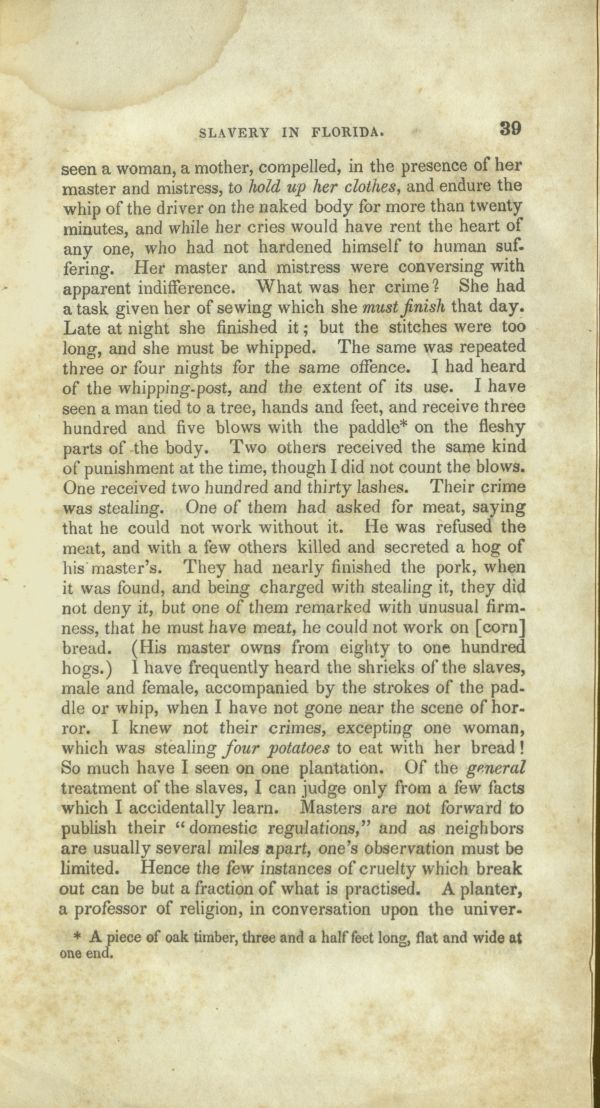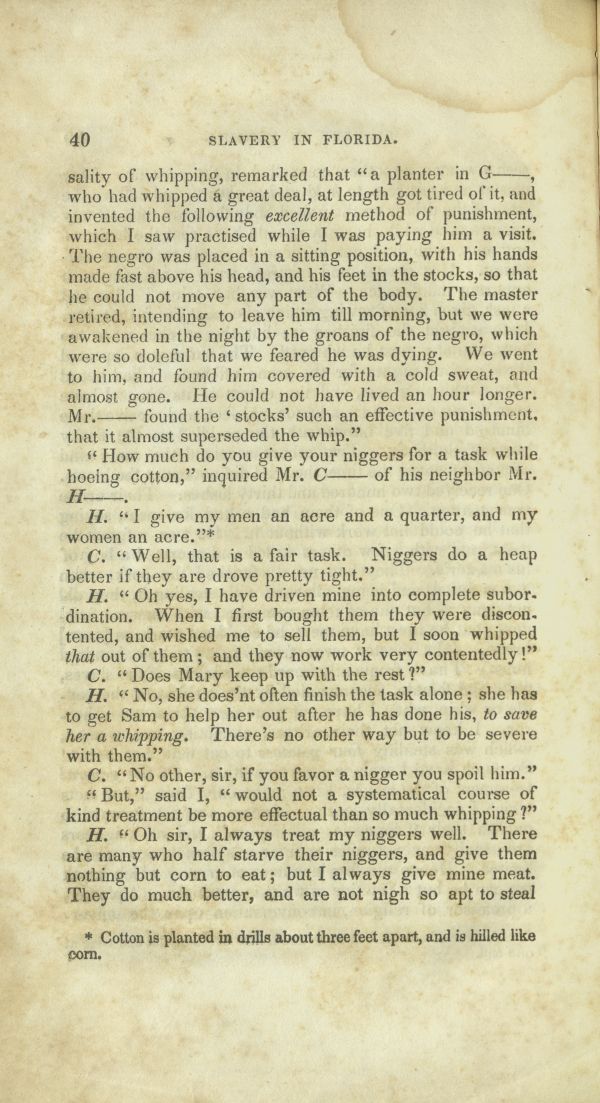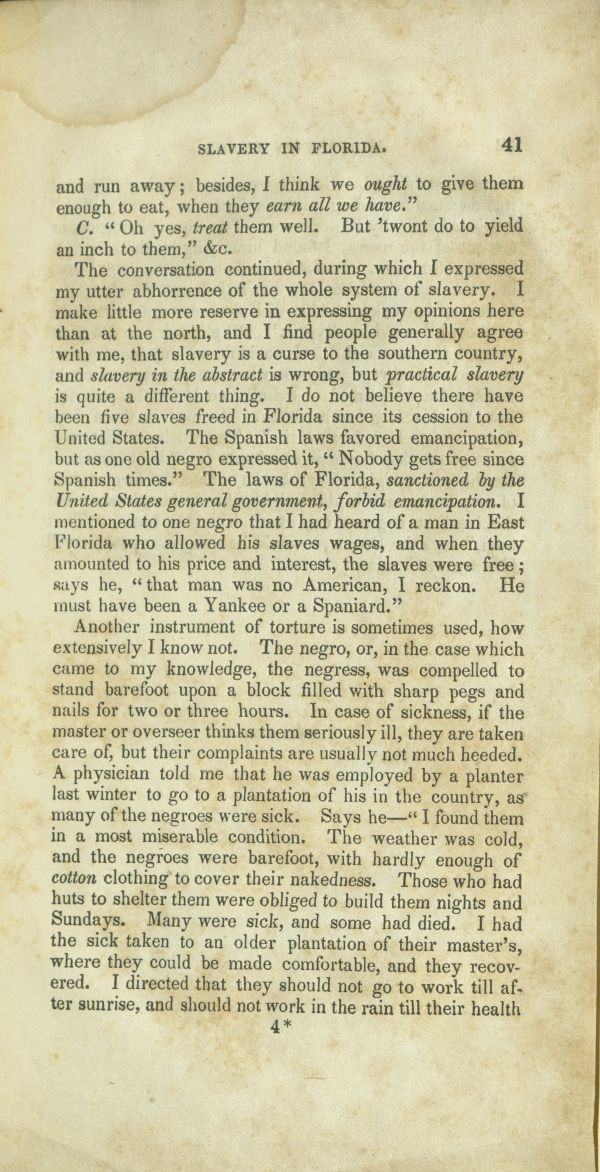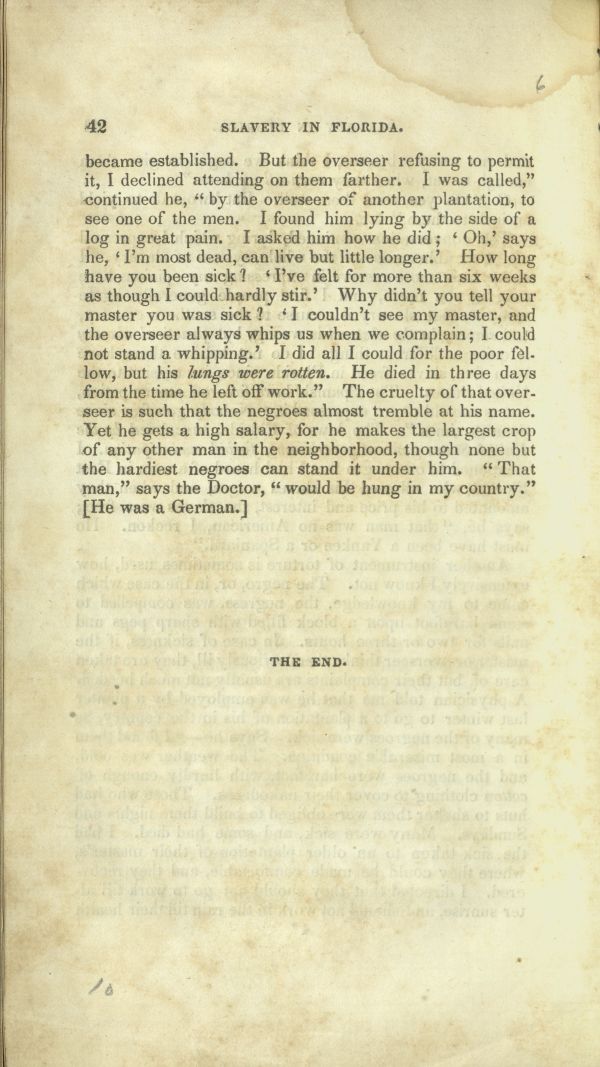Transcript
THE NARRATIVE OF AMOS DRESSER
WITH STONE’S LETTERS FROM NATCHEZ, - AN OBITUARY NOTICE OF THE WRITER, AND TWO LETTERS FROM TALLAHASSEE RELATING TO THE TREATMENT OF SLAVES.
NEW YORK:
PUBLISHED BY THE AMERICAN ANTI-SLAVERY SOCIETY,
144 NASSAU-STREET.
1836
[stamp] FLORIDA STATE LIBRARY
SLAVERY IN FLORIDA
35
best thing I can say to them.’’ On Sabbath Morning, reviving from a sinking fit, during which he was thought to be dying, he suddenly looked up. His eyes glowed with an inexpressible and unearthly brightness. He exclaimed -oh Lord! Glorious! Upon those standing around his bedside, it produced indescribable emotions. In a moment every cheek was sufficed with tears. We all felt an oppressive sense of goodness of God to our dear departing brother. It seemed like a direct manifestation of the divine presence to his soul, to cheer and strengthen it for its conflict with the last enemy. He immediately sunk back to his former lethargic state, from which he was never again aroused. Thus lived and died Asa A. Stone. In his death, the church has lost a son of the highest promise - the world a warm and efficient friend. Many will be the tears shed over his premature departure, and long will he live embalmed in the memory of those who shared his friend ship, knew his worth, and felt the vivifying influence of his example.
“Thou art gone to the grave- but we will not deplore thee,
Though sorrows and darkness encompass the tomb,
The Saviour has passed through it’s portals before thee,
And the lamp of his love is thy guide through the gloom.
Thou art gone to the grave- we no longer behold thee,
Nor tread the rough paths of the world by thy side,
But the wide arms of mercy are spread to enfold thee,
And sinners may hope since the Saviour hath died.
--------------------------------------
From the Ohio Atlas.
SLAVERY IN FLORIDA
NO. 1.
NEAR Tallahassee, May 11, 1835.
* * * * * * * * * * * * * * * * * * * * * Your letter was like a cordial to the famishing. Amidst the moral darkness and death around me, the sounds of life from afar cheer the spirits, and give trembling faith to the prayer from the speedy dawn of day.
I saw little, very little , of slavery in St. Augustine. It is in the Country, on plantations, the most of the rigors of tyranny are felt. You ask for facts relative to slavery in general. The request is too general. I might fill sheets, and still not give any information upon the particular point
SLAVERY IN FLORIDA
36
you wished. Ask definite questions, and as far as I can ascertain facts respecting them, your questions shall be fully answered. In speaking of slavery as it is, I hardly know where to begin. I consider the physical sufferings of the slaves as by no means the greatest evil of slavery. The contemplacion of the laws of most of the southern states, which consign the mind of the colored man to endless night, and which leave no measures untried to sink him to level with the brute, awakens in me stronger indignation than his groans under the lash. But the physical condition of the slave is far from being accurately known in the north. Gentlemen travelling in the south can know nothing of it. They must make the south their residence; they must live on plantations before they can have any opportunity of judging the condition of the slave. I resided in Augustine five months , and had I not made particular inquiries, which most northern visitors very seldom or never do, I should have left there with the impression that the slaves were generally well treated, and were very happy people. Such is the report of many northern travellers who have no more opportunity of knowing their real condition than if they had remained home. What confidence could we place in the reports of the travellers, relative to the condition of the Irish peasantry, who formed his opinion from the appearance of the waiters at the Dublin hotel, or the household servants of a country gentleman? And it is not often on plantations even, that strangers can witness the punishment of the slave. I was conversing the other day with a neighboring planter, upon the brutal of the slaves which I had witnessed: he remarked, that had I been with him I should not have seen this. “ When I whip niggers, I take them out of sight and hearing of the house, and no one in my family knows it. I would not on any consideration harden and brutalize the minds of my children by suffering them to witness a negro whipping.” Such being the difficulties in the way of a stranger ascertaining the treatment of the slaves, it is not to be wondered at the gentleman, of undoubted veracity, should give directly false statements relative to it. But facts cannot lie, and in giving these I
SLAVERY IN FLORIDA
37
confined myself to what has come under my own personal observation.
The negroes commerce labor by daylight in the morning, and , excepting the ploughboys, who must feed and rest their horses, do not leave the field till dark in the evening. They carry with them corn- meal wet with water, and at noon build a fire on the ground and bake it in ashes.
After having finished their field labors, they are occupied till nine or ten o’clock in doing chars, such as grinding corn, ( as all the corn in the vicinity is ground by hand) chopping wood, taking care of horses, mules,&c., and a thousand things necessary to be done on a large plantation.
If any extra job is to be done, it most not hinder niggers from their woak, but must be done in the night.” After the labors of the day are over, they take their second meal of ashcake. Some planters allow them meat. On Sunday, after the corn is shelled and rationed are given for the week, the negro has command of his time, though this day is not always allowed. It is spent in cultivating their “ patches” if they have any, in building or repairing their huts, in “toting” firewood for the week, and if they can get permission, in visiting their friends and relatives on other plantations, &c.&c. In describing the labors of the slave, I of course can speak of the usages of but few plantations. I state what I see, and my personal acquaintance relative to the domestic arrangements of plantations cannot extend far. Some planters, I am told, give tasks which can be finished before night, but I know of none such. One planter I do know of, who sometimes gives tasks, and if by extraordinary exertion they finish before dark, it is increased the next day, and the slave is whipped if he does not finish it.
I asked an old man I saw the other night, making a fence by torch-light, if he was tired when he came from the field. “ One can’t help being tired,” said he, “ beginning before we can well tell the cotton from the grass, and work without stopping till dark.” “ Don’t you stop at all?’ “ Just long enough to eat our bread at noon, sir: men grow mighty pushy when they are trying to to get rich,”&c. “I’d be mighty glad, says one, “ if I
SLAVERY IN FLORIDA
38
could be free; I’d work mighty hard to earn money to buy myself if I could get a chance.” I told him he would have to work if he was free. “ I know it,” he said, but wouldn’t work nights. We didn’t have to work nights in Virginia, but folks are mighty pushing about here.”
I told him that he would fare better to be faithful and content, for he could not become free. “ Not if massa gives me free?” “ No.” “ That’s hard,” with a sigh-- “ twan’t so in Virginia; there was a heap of free black folks there.” There is a good deal of contention among planters, who shall make the most cotton to the hand,or, who shall drive their negroes the hardest; and I have heard bets made and stakes upon the issue of the crops. Col.W. was boasting of his large crops, and swore that “ he made, for his force, the largest crop in the country.” he was disputed, of course. On riding home in the company with Mr. C., the conversation turned upon Col. W. My companion remarked that though Col.W. had the reputation of making a large crop, yet he could beat him himself, and did do it last year. I remarked that I considered it no honor to Col. W. to drive his slaves to death to make a large crop. Drivers or overseers usually drive the slaves worse than their masters. Their reputation for good overseers depends in great measure upon the crops they make, and the death of the slave is no loss to them. But I have no room to write farther. In my next I will speak of the punishment inflicted on the slave.
No.II.
TALLAHASSEE, June 9, 1835.
I promised in my last to give you some account of the treatment of the slaves. In this head I probably can say nothing new. You know the truth already. I knew it before I came here. Yet I hoped to have found the facts exaggerated. I have heard of females stripped and exposed to the insulting gaze and cruel laash of the driver. I have
SLAVERY IN FLORIDA
39
seen a woman, a mother, compelled, in the presence of her master and mistress, to hold up her clothes, and endure the whip of the driver on the naked body for more than twenty minutes, and while her cries would have rent the heart of any one, who had not hardened himself to human suffering. Her master and mistress were conversing with apparent indifference. What was her crime? She had a task given her of sewing which she must finish that day. Late at night she finished it; but the stitches were too long, and she must be whipped. The same was repeated three or four nights for the same offence. I had heard of the whipping-post, and the extent of its use. I have seen a man tied to a tree, hands and feet, and received three hundred and five blows with the paddle* on the fleshy parts of the body. Two others received the same kind of punishment at the time, though I did not count the blows. One received two hundred and thirty lashes. Their crime was stealing. One of them asked for meat, saying he could not work without it. He was refused the meat, and with a few others killed and secreted a hog of his master’s. They had nearly finished the pork, when it was found, and being charged with stealing it, they did not deny it, but one of them remarked with unusual firmness, that they must have meat, that he could not work on [corn] bread. (His master owns from eighty to one hundred hogs). I have frequently heard the shrieks of the slaves, male and female, accompanied by the strokes paddle or the whip, when I had not gone near the scene of horror. I knew not their crime, except one woman, who was stealing four potatoes to eat with her bread! So much have I seen on one plantation. Of the general treatment of the slaves, I can judge only from a few facts which I accidentally learned. Masters are not forward to publish their “domestic regulation,” and as neighbors are usually several miles apart, one’s observation must be limited. Hence the few instances of cruelty which break out can be but a fraction of what is practiced. A planter, a professor of religion, in conversation upon the unver-
* A piece of oak timber, three and half feet, flat and wide at end.
SLAVERY IN FLORIDA
40
sality of whipping, “a planter in G--------, who had whipped a great deal, at length got tired of it, and invented the following excellent method of punishment, which I saw practised while I was paying a visit. The negro was placed in a sitting position, with his hands made fast above his head, and his feet in the stocks, so that he could not move any part of his body. The master retired, intending to leave him till morning, but we were awakened in the night by the groans of the negro, which were so doleful that were feared he was dying. We went to him, and found him covered with a cold sweat, and almost gone. He could not have lived an hour longer. Mr.--------- found the stocks such an effective punishment, that it almost superseded the whip.”
“How much do you give your niggers for a task while hoeing cotton,” inquired Mr.C------ of his neighbor Mr. H.----.
H. I give my men an acre and a quarter, and my women an acre.”
C.” Well, that is a fair task. Niggers do a heap better if they are drove pretty tight.
H. “ Oh yes, I have driven mine into complete subordination. When I first bought them they were discontented, and wished me to sell them, but I soon whipped that out of them; and now they work very contentedly!”
C. “Does Mary keep up with the rest?”
H. “No, she doesn't often finish the task alone; she has to get the same to help her out after he has done his, to save her a whipping. There’s no other way but to be severe with them.
C. “ No other,sir, if you favor a nigger you spoil him.”
“But “ said I, “would not a systematic course of kind treatment be more effective than so much whipping?”
H. “Oh sir, I always treat my niggers well. There are many that half starve their niggers, and give them nothing corn to eat; but I always give mine meat. They do much better, and are not nigh so apt to steal
*Cotton is planted in drills about three feet apart, and is hilled like corn
SLAVERY IN FLORIDA
41
and run away; besides, I think we ought to give them enough to eat, when they earn all we have.”
C. `` Oh yes, treat them well. But ‘twont do to yield an inch to them,'' &c.
The conversation continued, during which I expressed my utter abhorrence of the whole system of slavery. I make little more reserve in expressing my opinions here than the north, and I find people generally agree with me, that slavery is a curse to the southern country, and slavery in the abstract is wrong, but practical slavery is quite a different thing. I do not believe there have been five slaves freed in Florida since its cession to the United States. The Spanish laws favored emancipation, but as one negro expressed it, “ Nobody gets free since Spanish times.” The laws of Florida, sanctioned by the United States general government, forbid emancipation. I mentioned to one negro that I had heard of a man in East Florida who allowed his slaves wages, and when they amounted to his price and interest, the slaves were free; says he, “ that a man is no American, I reckon. He must have been a Yankee or a Spaniard.”
Another instrument of torture is sometimes used, how extensively I know not. The negro, or, in the case which came to my knowledge, the negress, was compelled to stand barefoot upon a block filled with sharp pegs and nails for two or three hours. In case of sickness, if the master or overseer thinks them seriously ill, they are taken care of, but their complaints are usually not much heeded. A physician told me that he was employed by a planter last winter to go to a plantation of his in the country, as many of the negroes were sick. Says he--”I found them in a miserable condition. The weather was cold, and the negroes were barefoot, with hardly enough of cotton clothing to cover their nakedness. Those who had huts to shelter them were obliged to build them nights and Sundays. Many were sick, and some had died. I had the sick taken to an older plantation of their master’s, where they could be made comfortable, and they recovered. I directed that they should not go to work till after sunrise, and should not work in the rain till their health
4*
SLAVERY IN FLORIDA
42
became established. But the overseer refused to permit it, I declined attending to them farther. I was called,’ continued he,”by the overseer of another plantation, to see one of the men. I found him lying by the side of a log in great pain. I asked him how he did; ‘Oh,’ says he, ‘ I’m most dead, can live but little longer.’ How long have you been sick? ‘ I’ve felt for more than six weeks as though I could hardly stir.’ Why didn’t you tell your master you were sick? ‘ I couldn’t see my master, and the overseer always whips us when we complain; I could not stand a whipping.’ I did all I could for the poor fellow, but his lungs were rotten. He died in three days from the time he left work.” The cruelty of that overseer is such that the negoes almost tremble at his name. Yet he gets a high salary, for he makes the largest crop of any other man in the neighborhood, though none but the hardiest negroes can stand it under him. “ That man,’’ says the Doctor, “ would be hung in my country.”
[ He was a German.]
THE END.

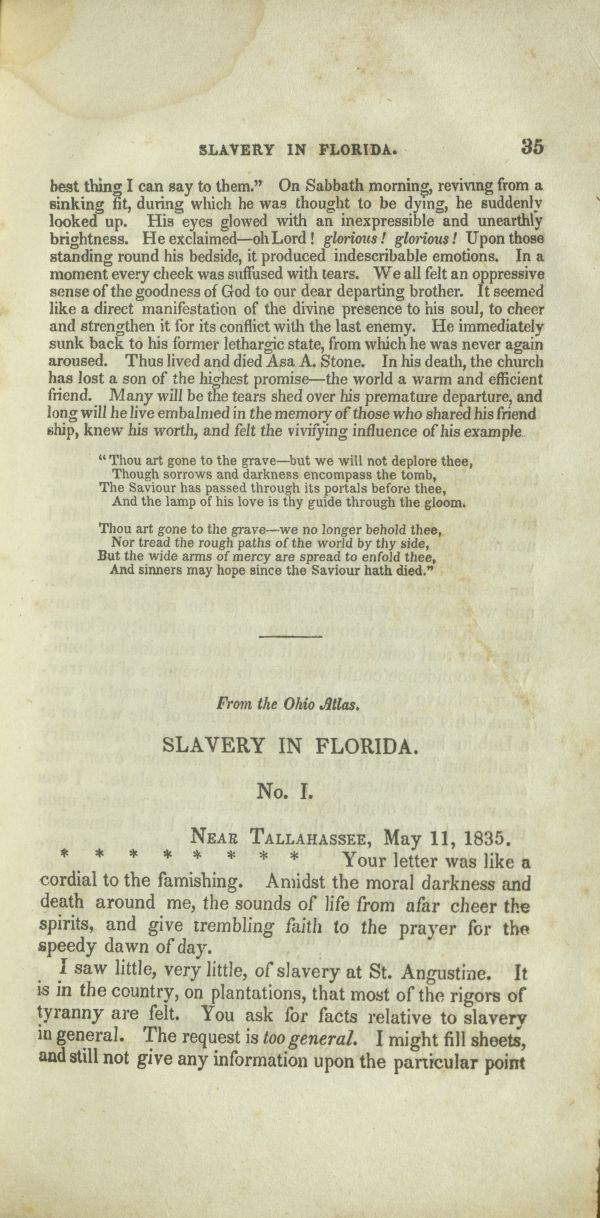


 Listen: The Blues Program
Listen: The Blues Program